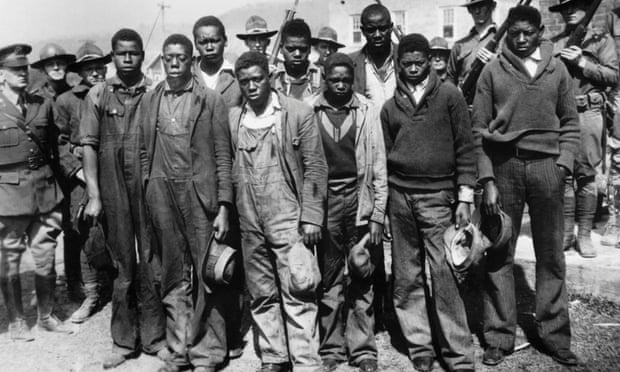General Discussion
Related: Editorials & Other Articles, Issue Forums, Alliance Forums, Region ForumsJim Crow lynchings more widespread than first thought, report concludes
Equal Justice Initiative report reveals history of racial violence and finds at least 700 more lynchings than previously recorded in southern states.
http://www.theguardian.com/world/2015/feb/10/history-of-lynchings-and-racial-violence-continues-to-haunt-us
In 1919, a black soldier returned home to Blakely, Georgia, having survived the horrors of the first world war only to face the terrors of a white mob that awaited him in the Jim Crow-era south. When the soldier, William Little, refused to remove his army uniform, the savage mob exacted their punishment.
Little was just one of 3,959 African Americans who were brutally and often publicly killed across the southern states between the end of the Reconstruction era and the second world war, which is at least 700 more lynchings in these states than previously recorded, according to a report released on Tuesday by the Equal Justice Initiative (EJI). The authors’ inventory of nearly 4,000 victims of what the report calls “terror lynchings” reveals a history of racial violence more extensive and more brutal than initially reported.
The report argues that atrocities carried out against African Americans during this period were akin to terrorism, and that lynchings were a tool to “enforce racial subordination and segregation”. It is the follow-up to the organisation’s 2013 report Slavery in America.
“It’s important to begin talking about it,” Stevenson said. “These lynchings were torturous and violent and extreme. They were sometimes attended by the entire white community. It was sometimes not enough to lynch the person who was the target, but it was necessary to terrorise the entire black community: burn down churches and attack black homes. I think that that kind of history really can’t be ignored.”
Read it here: http://www.theguardian.com/world/2015/feb/10/history-of-lynchings-and-racial-violence-continues-to-haunt-us
In 1931, the Alabama governor called the National Guard to the Scottsboro jail to protect a group of young black men who he believed might be lynched after being accused of raping two white girls. Photograph: Bettmann/Corbis
"<img src= >"
>"
el_bryanto
(11,804 posts)from a historical perspective. Some communities down there decided to cover up lynchings and minimize them. Even if the town leaders didn't actually participate (and they often did), they still wouldn't want the record to reflect what hand been done in their town.
Of course other towns bragged about it; there's something sociopathic about Southern Culture in that era.
Bryant
exboyfil
(17,863 posts)or writings by white pastors during this period of time. I found it interesting in reading an 1861 sermon that justified slavery that the pastor put a qualifier in the printed sermon (which he did not want disseminated) that the sermon was specific for his congregation. Chances are those religious leaders who justified such behavior were careful to ensure that their words were not recorded.
MUTUAL RELATION OF MASTERS AND
SLAVES AS TAUGHT IN THE BIBLE.
A DISCOURSE
PREACHED IN THE
FIRST PRESBYTERIAN CHURCH,
AUGUSTA, GEORGIA,
On Sabbath Morning, Jan. 6, 1861,
BY
JOSEPH R. WILSON, D. D., PASTOR
http://docsouth.unc.edu/imls/wilson/wilson.html
Gentlemen:--I confess to an honest reluctance in allowing the publication of the sermon, a copy of which you politely request. It was not written with a view to wide circulation, nor was it prepared with exclusive reference to the present unhappy agitations of the popular mind.
Our attention is forcibly arrested by the very first word of this text; "servants." There is no difficulty in ascertaining its true meaning, in the original Greek. It distinctly and unequivocally signifies "slaves," springing as it does in this its substantive form from a verbal root, which means to bind.
TexasTowelie
(112,202 posts)from my university, Jessie Daniel Ames.
From Wikipedia:
Jessie, a single 31-year-old with three children to support, moved in with her mother and helped with the family business. She also became involved with several Methodist women's groups. This involvement was the impetus for her involvement in the women's suffrage movement.
In 1916 she organized a local women's suffrage association in Texas and helped the state become the first one to ratify the Nineteenth Amendment. In 1919, she was the founding president of the Texas League of Women Voters. She also served as a delegate to the Democratic National Conventions of 1920, 1924, and 1928. In 1929 she became the director of the women's committee of the Commission on Interracial Cooperation (CIC).
In 1930 Ames founded the Association of Southern Women for the Prevention of Lynching, which obtained the signatures of 40,000 women to their Pledge (see below) Against Lynching. Despite hostile community opposition and physical threats, they conducted petition drives, lobbying and fundraising across the South to work against lynching.
I recall that one of our annual symposiums at Southwestern (either 1984 or 1985) was about Ames and the history of lynching in the South. The discussions were interesting and provided perspective on race relations in the South during the first half of the 20th century.
zazen
(2,978 posts)and then they named a small town after him (my last name too). Ugh.
I always wanted to try to track down the family of the poor guy, who was murdered for "outraging a young white girl of good repute." OTOH the descendants (assuming I could find any) probably don't want to be on the receiving end of my white liberal guilt.
exboyfil
(17,863 posts)of skin from a lynched man like this Tennessee official did to an African American man who lodged a complaint about the potentially racially based response of paramedics to his mom who was having a heart attack.
http://www.rawstory.com/rs/2014/02/tenn-official-threatened-blacks-with-skin-trophy-he-saved-from-1896-lynching/
I firmly believe that an individual cannot apologize for the actions of another. The one exception would be making some sort of compensation if you benefited directly from the the immoral actions of ancestor (such as through inheritance).